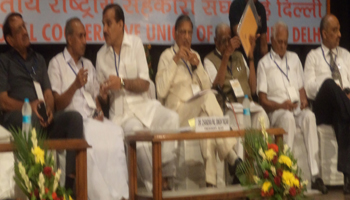

The proposed bill allows any cooperative entity including Urban Cooperative Banks and credit societies to convert themselves into private legal entities without any hassle- a demand the largest UCB of the country, Saraswat Cooperative Bank has been making for many years.
But the suggestion sent by the apex cooperative body NCUI to the Ministry strongly contests this provision. ” We are ready for conversion but it must be within the frame-work of cooperative only,” several cooperators told Indian Cooperative.
Cooperators are also opposed to Central Registrar’s power of arbitration. They fear that the appointment of any third person as arbitrator by the Registrar has the pitfalls of becoming unfair exercise. They would prefer an arbitrator from the panel of officers of the Ministry rather than Tom Dick and Harry.
Another irritant is the redemption of share and on the issue of book value vs face value. Cooperators seems not to buy government take on the issue.
The new provision says that anybody including the nominated member could be the Chairman of the cooperative body but cooperators are opposed to this provision. They argue since cooperatives are controlled by the democratic values only elected members have a right to run for chairman.
The NCUI is also fighting against the provision of shifting the custody of Education Fund to any organization should the need arise. The NCUI, however argues no other body has the necessary infrastructure to maintain such a large fund and only the NCUI is ideally placed to do so.
The NCUI has sent its suggestions to the Ministry by incorporating the views of different cooperative sectors including IFFCO, Kribhco, NAFCUB, Sugar and others, informed the Chief Executive Dr Dinesh.
We tried to include all the issues suggested by our members such as high dividend rate in case of earnings from foreign countries for cooperatives, checking unbridled power of Central Registrar in amending by-laws of a cooperative society and the NCUI’s right to maintain the custody of Fund to be created for the rehabilitation of sick cooperatives.
The Ministry is in the process of collecting suggestions from various sources as the bill is likely to go to Parliament in the next session.




















































97th CAA?
” We are ready for conversion but it must be within the frame-work of cooperative only,” this statement coming from the Co-operatives themselves sounds an ‘anti-cooperative’stance.If the owners being the members of Urban Co-operative bank’ reach a conclusion that it was more appropriate to pursue the business of “Urban Banking” hither to run under co-operative principles, as a Privately owned enterprise henceforth by the same people, how a State can deny that fundamental right to do the business through a form the owners thought appropriate? Are we clear about cooperative fundas or still confused? later seems more true.How do such people object to political interference? How are they different from the politicians?
Objection to provision that “NOMINATED MEMBER COULD BE THE CHAIRMAN OF THE COOPERATIVE BODY” is violative of Proviso 2 to Article 243ZI(3) reproduced here: “Provided further that such co-opted members shall not have the right to vote in any election of the co-operative society in their capacity as such member or to be eligible to be elected as office bearers of the board:”
A suggestion for “CHECKING UNBRIDLED POWER OF CENTRAL REGISTRAR IN AMENDING BY-LAWS OF A COOPERATIVE SOCIETY” needs to be reinforced by substituting two words “CHECKING UNBRIDLED” by “REPEALING THE” which is in consonance with the recommendations of several Committees which put in enormous efforts in the nineteen nine-tees to position the cooperatives on right track.In rare case of abuse of power by majority Cooperative Courts should have the jurisdiction to intervene.